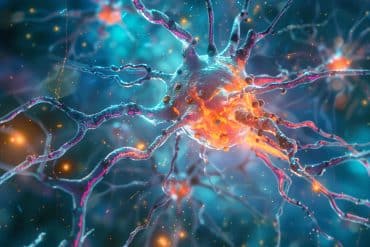Summary: Study reveals a new role for serotonin in the development of the human neocortex. Serotonin acts cell-extrinsically as a growth factor for basal progenitors in the developing neocortex. Researchers report placenta-driven serotonin likely contributed to the evolutionary expansion of the neocortex in humans.
Source: Max Planck Society
During human evolution, the size of the brain increased, especially in a particular part called the neocortex. The neocortex enables us to speak, dream and think. In search of the causes underlying neocortex expansion, researchers at the Max Planck Institute of Molecular Cell Biology and Genetics in Dresden, together with colleagues at the University Hospital Carl Gustav Carus Dresden, previously identified a number of molecular players. These players typically act cell-intrinsically in the so-called basal progenitors, the stem cells in the developing neocortex with a pivotal role in its expansion.
The researchers now report an additional, novel role of the happiness neurotransmitter serotonin which is known to function in the brain to mediate satisfaction, self-confidence and optimism—to act cell-extrinsically as a growth factor for basal progenitors in the developing human, but not mouse, neocortex. Due to this new function, placenta-derived serotonin likely contributed to the evolutionary expansion of the human neocortex.
The research team of Wieland Huttner at the Max Planck Institute of Molecular Cell Biology and Genetics, who is one of the institute’s founding directors, has investigated the cause of the evolutionary expansion of the human neocortex in many studies.
A new study from his lab focuses on the role of the neurotransmitter serotonin in this process. Serotonin is often called the happiness neurotransmitter because it transmits messages between nerve cells that contribute to well-being and happiness.
However, a potential role of such neurotransmitters during brain development has not yet been explored in detail. In the developing embryo, the placenta produces serotonin, which then reaches the brain via the blood circulation. This is true for humans as well as mice. Yet, the function of this placenta-derived serotonin in the developing brain has been unknown.
The postdoctoral researcher Lei Xing in the Huttner group had studied neurotransmitters during his doctoral work in Canada. When he started his research project in Dresden after that, he was curious to investigate their role in the developing brain.

Lei Xing says, “I exploited datasets generated by the group in the past and found that the serotonin receptor HTR2A was expressed in fetal human, but not embryonic mouse, neocortex. Serotonin needs to bind to this receptor in order to activate downstream signaling. I asked myself if this receptor could be one of the keys to the question of why humans have a bigger brain.”
To explore this, the researchers induced the production of the HTR2A receptor in embryonic mouse neocortex. “Indeed, we found that serotonin, by activating this receptor, caused a chain of reactions that resulted in the production of more basal progenitors in the developing brain. More basal progenitors can then increase the production of cortical neurons, which paves the way to a bigger brain,” continues Lei Xing.
Significance for brain development and evolution
“In conclusion, our study uncovers a novel role of serotonin as a growth factor for basal progenitors in highly developed brains, notably human. Our data implicate serotonin in the expansion of the neocortex during development and human evolution,” summarizes Wieland Huttner, who supervised the study.
He continues: “Abnormal signaling of serotonin and a disturbed expression or mutation of its receptor HTR2A have been observed in various neurodevelopmental and psychiatric disorders, such as Down syndrome, attention deficit hyperactivity disorder and autism. Our findings may help explain how malfunctions of serotonin and its receptor during fetal brain development can lead to congenital disorders and may suggest novel approaches for therapeutic avenues.”
About this neuroscience research news
Source: Max Planck Society
Contact: Press Office – Max Planck Society
Image: The image is credited to Lei Xing et al., Neuron 2020 / MPI-CBG
Original Research: Closed access.
“Serotonin Receptor 2A Activation Promotes Evolutionarily Relevant Basal Progenitor Proliferation in the Developing Neocortex” by Lei Xing et al. Neuron
Abstract
Serotonin Receptor 2A Activation Promotes Evolutionarily Relevant Basal Progenitor Proliferation in the Developing Neocortex
Highlights
- •5-HT receptor HTR2A is expressed in developing ferret and human, not mouse, neocortex
- •HTR2A is required for, and suffices to increase, basal progenitor (BP) proliferation
- •HTR2A activation increases proliferative BPs at the expense of neurogenic BPs
- •HER2 and ERK1/2 signaling are required for HTR2A-induced BP proliferation
Summary
Evolutionary expansion of the mammalian neocortex (Ncx) has been linked to increased abundance and proliferative capacity of basal progenitors (BPs) in the subventricular zone during development. BP proliferation is governed by both intrinsic and extrinsic signals, several of which have been identified. However, a role of neurotransmitters, a canonical class of extrinsic signaling molecules, in BP proliferation remains to be established. Here, we show that serotonin (5-HT), via its receptor HTR2A, promotes BP proliferation in an evolutionarily relevant manner. HTR2A is not expressed in embryonic mouse Ncx; accordingly, 5-HT does not increase mouse BP proliferation. However, ectopic HTR2A expression can increase mouse BP proliferation. Conversely, CRISPR/Cas9-mediated knockout of endogenous HTR2A in embryonic ferret Ncx reduces BP proliferation. Pharmacological activation of endogenous HTR2A in fetal human Ncx ex vivo increases BP proliferation via HER2/ERK signaling. Hence, 5-HT emerges as an important extrinsic pro-proliferative signal for BPs, which may have contributed to evolutionary Ncx expansion.






